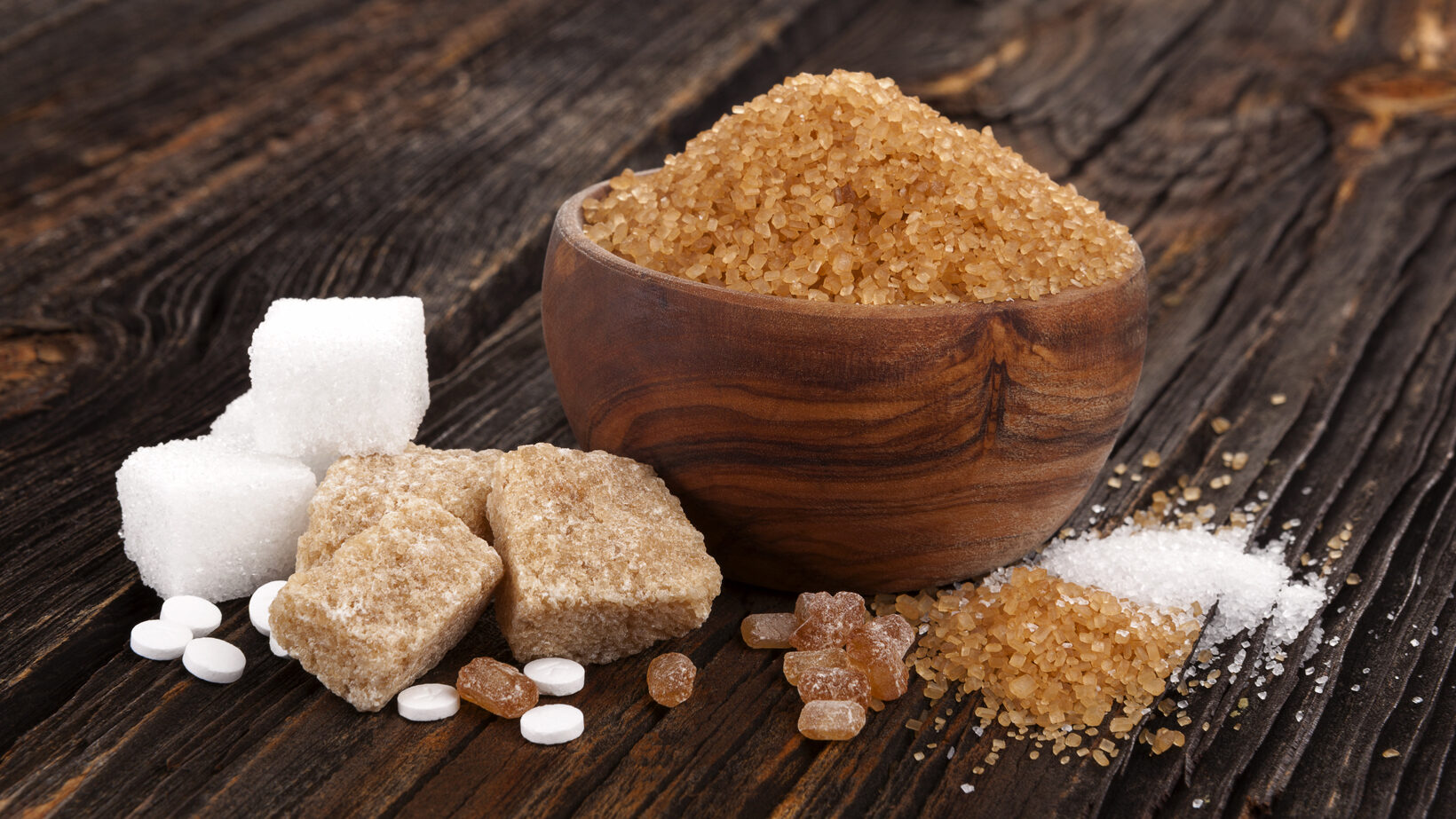The average consumer is more informed about nutrition than ever before. As such, there’s been a growing movement in the processed food and dietary supplement industry to embrace more natural additives (colors, flavors, and sweeteners) to their products.
But, what are the benefits (and potential drawbacks) to using natural vs artificial sweeteners and vice versa?
Let’s discuss.
Related – Plant Protein Taste Review
What Are Artificial Sweeteners?
Quite simply, artificial sweeteners are low- or no-calorie sugar substitutes that yield negligible nutritional value. While scant in calories or micronutrients, artificial sweeteners can sweeten and enhance the flavor of foods or beverages.
The most common artificial sweeteners are:
- Sucralose (Splenda) — 600 times sweeter than sugar
- Aspartame (Equal) — 180 times sweeter than sugar
- Saccharin (Sweet N Low) — 300 times sweeter than sugar
- Acesulfame Potassium (Ace-K) — 200 times sweeter than sugar
- Neotame (NutraSweet) — 7,000 to 13,000 times sweeter than sugar! [1]
Sucralose currently holds down the #1 spot amongst all non-nutritive sweeteners, as it holds ~30% of the global artificial sweetener market share. Recent estimates suggest the sweetener will be worth roughly $3 billion by 2022. [2]
Pros & Cons of Natural vs Artificial Sweeteners
Sugar Content & Calories
The main reason artificial sweeteners were developed and are so widely used is due to the fact that they can make foods and drinks taste sweet (like sugar), but they do not contain any actual calories. Essentially, are bodies cannot break down these molecules, and as such, we cannot derive energy from them.
Considering that we are in the midst of a three-headed epidemic (diabetes, obesity, and metabolic syndrome), anything that helps reduce the calorie intake of the populace’s burgeoning waistline is an ally.
Note: The average teaspoon of sugar contains 15 calories, and current estimates suggest that the prototypical American ingests the equivalent of 3 pounds (6 cups) of sugar each week from foods and drinks.
Plus, artificial sweeteners do not spike blood sugar and insulin levels in the body [1], making them that much more appealing of a sweetener compared to regular sugar.
Dental Caries
Sugar is a major contributor to dental caries (cavities) and tooth decay. By swapping sugar-sweetened foods and drinks for ones sweetened with artificial sweeteners, you may help reduce the onset of cavities.
The reason that sugar is so heavily implicated in declining oral health is that it can foster the growth of bacteria and plaque along the gum line.
Overeating
Just because a given food contains artificial sweeteners and/or is marketed as sugar-free, does not mean it is free of calories, or even low in calories.
However, many people make the mistake of equating sugar-free with calorie-free. As a result, they end up over-consuming, leading to weight gain.
Potential for GI Distress
Sugar alcohols are a low-calorie “natural” sweetening agent that is a touch less sweet than sugar. They are a type of carbohydrate naturally occurring in various fruits and vegetables (though they can also be manufactured), that contain fewer calories per gram than regular sugar.
And, contrary to the fact that the name contains “alcohol”, consuming high amounts of sugar alcohols will not lead to inebriation, because they do not contain ethanol — the stuff in alcohol drinks that gets you drunk.
Sugar alcohols also do not come with the risk of cavities and tooth decay that sugar does, which is why it’s very frequently used in sugar-free candies, gum, and chocolates. And, consumed in low quantities, sugar alcohols have a negligible impact on blood sugar levels.
However, consuming excessive amounts of sugar alcohol has been known to cause bloating, flatulence, and diarrhea.
The reason for this is that sugar alcohols are not completely absorbed by the digestive system, leading to fermentation in the intestines.
Taste
Taste is incredibly subjective. Some people cannot stand the “artificial” taste that artificial sweeteners give food. On the flip side, there’s an equal number of individual people that do not enjoy the taste of products that use natural sweeteners like Stevia.
For example, I can’t stand the taste of Stevia in coffee, but in tea, I find it enjoyable.
Baked goods are another concern as the baking process can alter the taste of artificial sweeteners quite significantly.
Cost
Naturally sweetened and flavored products tend to be a bit more expensive than their artificially-enhanced counterparts. The reason for this is simple — it costs more time, labor, and product to make natural extracts and sweeteners than it does artificial ones.
But for those looking to live as natural a life as possible, one free from artificial flavors and colors, the added expense is well worth it.
Possibly Limit Exposure to Pesticides
Naturally-flavored or sourced produced tend to be made from organic ingredients, and as such, they may be free artificial pesticides, herbicides, and other pollutants — thereby reducing your exposure (and that of the environment) to these chemicals.
Now, it should be noted that not all naturally sweetened products are organic certified. Therefore, if you want to limit your exposure to these kinds of compounds, you need to make sure your naturally sweetened product (and the ingredients in it) are certified organic, non-GMO, etc.
“Health Concerns” (i.e. Cancer)
Opponents of artificial sweeteners are quick to decry the widespread use of the alternative sweeteners for fear that these “chemicals” lead to cancer. This primarily stems from studies performed in rats in the 1970s that found that high doses of saccharin led to bladder cancer.
However, several health agencies (including the National Cancer Institute), have found no considerable body of evidence proving the responsible use of artificial sweeteners causes cancer (or any other serious health problems for that matter).
In fact, research has even confirmed that artificial sweeteners (when used within reason) are safe for pregnant women.
It’s also important to realize that everything we ingest (naturally occurring and man-made) is made of “chemicals”. Water (dihydrogen monoxide) could be considered the most important chemical to humans, as our bodies are made up of ~60% water.
The takeaway here is that just because something is artificially created does not inherently mean it’s dangerous, and on the flip side just because something is “natural” doesn’t make it perfectly safe.
Two classic examples of this are hemlock and cyanide — both of these are naturally occurring and both are extremely deadly.
Takeaway
At the end of the day, moderation is key.
A healthy diet can include both artificial and natural sweeteners.
Artificial sweeteners do not carry the health risks that many would lead you to believe. But, at the same time, remember foods labeled as sugar-free aren’t calorie-free, meaning consuming them in excess will cause weight gain.
So long as sweetened-foods (regardless if they are natural or artificial) aren’t making up the foundation of your diet, you can mix and match as you see fit and be none the worse for wear.
References
2. Nichol, A. D., Holle, M. J., & An, R. (2018). Glycemic impact of non-nutritive sweeteners: a systematic review and meta-analysis of randomized controlled trials. European Journal of Clinical Nutrition, 72(6), 796–804. https://doi.org/10.1038/s41430-018-0170-6








